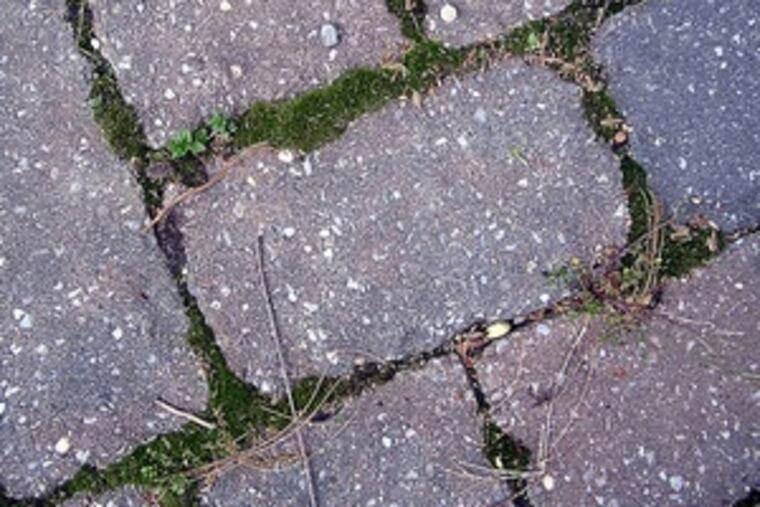Your Place | A power-washed walkway will likely gather no moss
Question: How can I remove the moss from my brick walkway? Answer: Power washing will usually work, but you want to use pressure below 3,000 pounds per square inch so you don't chip the brick. Brick is porous and comparatively soft, and a little too much pressure can easily damage the surface. Experts recommend removing moss while it is growing. Algae and moss thrive in shady spots, so you might want to trim back bushes and tree limbs to let more light in. You may have to clean your walkway frequently to keep up with the moss.

Question:
How can I remove the moss from my brick walkway?
Answer: Power washing will usually work, but you want to use pressure below 3,000 pounds per square inch so you don't chip the brick. Brick is porous and comparatively soft, and a little too much pressure can easily damage the surface. Experts recommend removing moss while it is growing. Algae and moss thrive in shady spots, so you might want to trim back bushes and tree limbs to let more light in. You may have to clean your walkway frequently to keep up with the moss.
In your e-mail to me, you said you didn't want to use bleach. Sometimes, a solution of chlorine bleach and warm water (10 percent bleach, or so I've been told) will be needed to remove stubborn stains. But as I have warned in articles about deck cleaning, bleach can damage nearby plants and grass. They will require some protection.
Q: I'm the property manager of a historic church that is frequently the target of vandals who spray-paint graffiti on the walls. I keep calling the city to remove the graffiti, but they are growing tired of coming out. Can I remove the graffiti myself?
A: Most likely you can. Many commercial solvents on the market work well on all surfaces, including stucco, natural brick and cement. I'd go to the paint department of a local hardware store for advice. If you bring along photos, it might help them make recommendations.
When working on porous surfaces such as brick or stucco, apply the solvent and let it soak, then agitate with a vinyl or wire brush and rinse with water. Best results are achieved using a power washer to rinse off the solvent. Be careful when using a solvent on painted surfaces, though - it can remove the original paint. Best results come when removing small amounts of graffiti, or graffiti from a marker.
Q: My real estate agent won't go along with the price we want to ask for our house. He says that it is too high for the market and that with so many houses for sale, buyers have lots of choices. My husband won't budge because our neighbors, who didn't have as nice a house as we do, got $25,000 more than they asked a couple of years ago.
The agent also says our house needs work, but my husband won't do anything because he says they should buy it as is. Who's right?
A: First, it isn't a couple of years ago, and the market has changed. Sellers are no longer in the driver's seat. If your reasonable-sounding agent did his or her job properly, which is what I suspect, you and your husband were given a competitive market analysis that should list the sale prices of houses comparable to yours that have closed in the last six months in your area. Your husband can always call another agent from another firm, and if that agent is honest, he or she will tell your husband exactly what the first agent told him.
Second, the relative merit of your house versus that of your former neighbors is subjective. If your husband won't follow the agent's advice, why bother with an agent anyway? Let him try to sell it and see what happens.
What will happen, I suspect, is that the house will linger on the market. My advice: Keep the agent's phone number handy. You'll need it.